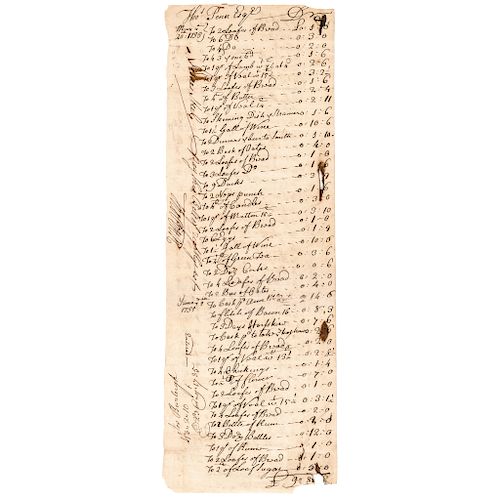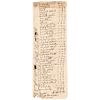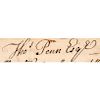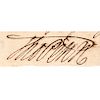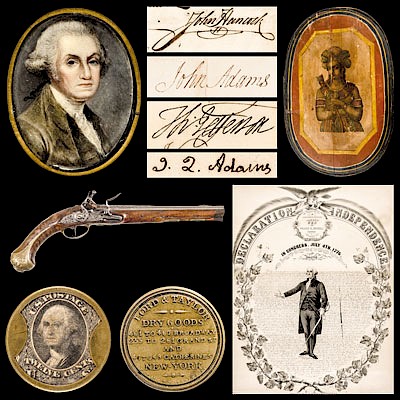1735 THOMAS PENN SR Signed Manuscript Document Inventory List of Items Purchased
Lot 90
Estimate:
$600 - $800
Absentee vs Live bid
Two ways to bid:
- Leave a max absentee bid and the platform will bid on your behalf up to your maximum bid during the live auction.
- Bid live during the auction and your bids will be submitted real-time to the auctioneer.
Bid Increments
| Price | Bid Increment |
|---|---|
| $0 | $10 |
| $200 | $20 |
| $300 | $25 |
| $500 | $50 |
| $1,000 | $100 |
| $2,000 | $200 |
| $3,000 | $250 |
| $5,000 | $500 |
| $10,000 | $1,000 |
| $20,000 | $2,000 |
| $30,000 | $2,500 |
| $50,000 | $5,000 |
| $100,000 | $10,000 |
| $200,000 | $20,000 |
| $300,000 | $25,000 |
| $500,000 | $50,000 |
About Auction
By Early American History Auctions
Jun 1, 2019
Set Reminder
2019-06-01 12:00:00
2019-06-01 12:00:00
America/New_York
Bidsquare
Bidsquare : Historic Autographs, Colonial Currency, Political Americana & Revolutionary War Era
https://www.bidsquare.com/auctions/early-american-history-auctions/historic-autographs-colonial-currency-political-americana-revolutionary-war-era-4152
Historic Autographs, Coins, Currency, Political, Americana, Historic Weaponry and Guns, John Adams, Thomas Jefferson, Early American History Auctions auctions@earlyamerican.com
Historic Autographs, Coins, Currency, Political, Americana, Historic Weaponry and Guns, John Adams, Thomas Jefferson, Early American History Auctions auctions@earlyamerican.com
- Lot Description
Colonial America
1735 Thomas Penn, Sr. as Lord Proprietor of Pennsylvania Signed Handwritten Inventory Listing of Items Purchased
THOMAS PENN (1702-1775). Lord Proprietor of Pennsylvania (1, a Son of William Penn the Founder of the Province of Pennsylvania. Thomas Penn inherited the position of Proprietor of the Colony of Pennsylvania for the Crown of England in 1718 along with his brothers John and Richard, on the death of their father William Penn, until 1746 when John died. Thomas continued as the Proprietor with Richard's son, John, and with his own son John Penn until 1775.
August 23, 1735-Dated, Manuscript Document Signed, "Tho(mas) Penn," (Son of William Penn), being a Handwritten Inventory Listing of Items purchased, measuring about 12.5" tall x 4.5" wide, 2 pages (1 sheet written front and back), Very Fine. This original Handwritten inventory list of Thomas Penn (1702-1775) is detailing various items purchased from merchant Joseph Burleigh, during the months of May-August 1735 for a total sum of amounting to 13 Pounds, Two Shillings and Ten Pence. Signed by Thomas Penn along the open margin side on front writing, "James Steele - Pay this Bill of the earliest (?) - (Signed) Tho. Penn". Also, Signed by Burleigh in receipt. Light wear with some ink erosion causing a small piece to be missing to the bottom edge at the final calculation. Some archival fiber tape reinforcement to one fold split and prior mounting traces at the reverse side top edge. Overall, boldly written in rich deep brown ink which is easily readable, nicely signed by Thomas Penn and boldly dated in several locations as being the year 1735.
Thomas Penn Sr. (1702-1775), inherited the position of Proprietor of the Colony of Pennsylvania for the Crown of England in 1718 along with his brothers John and Richard on the death of their father William Penn, until 1746 when John died. Thomas continued as the Proprietor with Richard's son, John, and his own son John Penn until 1775. He tried to bring his family out of the debt that had plagued his father. He asserted his independence from the Quakers, and tried to assert his control of the colony almost as a feudal lord.
On May 12, 1732 Thomas with his brothers John and Richard, as the proprietors of Pennsylvania, signed an order to create a commission. This order was directed to Governor Gordon, Isaac Norris, Samuel Preston, James Logan, and Andrew Hamilton, Esquires, and to the gentlemen James Steel and Robert Charles.
The commission, which was to be made up of at least three or more of these individuals, was given full power on behalf of the proprietors for the "running, marking, and laying out" of any boundary between Pennsylvania and Maryland. This was in accordance to the agreement signed between the Penn brothers and Charles Calvert, 5th Baron Baltimore on May 10, 1732.
Penn arrived in Pennsylvania in August, 1732, and organized the purchase of some of the lands at the outskirts of the Pennsylvania colony. He met with some of the local Indian chiefs and tried to keep the peace as immigrants poured into the countryside north and west of Philadelphia on the Susquehanna, Schuylkill, and Delaware Rivers.
Many of the Indians did not want to sell their land, and had not heard of William Penn's 1686 treaty. Finally in 1737 Acting Governor James Logan convinced several Indian Chiefs to confirm the 1686 deed, which gave the Penns the land west of the Delaware River to the extent that a man could walk in a day and a half.
Logan hired several men to walk the measure, but they walked west at a very fast pace and the Indians felt cheated. Logan and the Penn sons including Thomas were later criticized by some for this "Walking Purchase" and their questionable treatment of the Indians. Part of the difficulty lay in the conflict with the French who laid claim on the back country west of Pennsylvania and the ensuing hostilities of King George's War (1744-1748) and the French and Indian War (1754-1763).
Thomas Penn lobbied against Quaker efforts to make peace with the Iroquois and Algonquian tribes some of whom were allied with the French. The proprietor Penn brothers sold much of their western lands to European settlers, who did not know of the controversy and as a result, may have become resentful of the proprietors.
Penn tried to stop the introduction of Roman Catholicism in the colony. In 1733 a Catholic chapel was built in Philadelphia, and in 1734 Penn attempted to suppress the movement, but the Quaker-led legislative assembly protected the rights of Catholics to worship and build churches.
Penn visited the countryside of Pennsylvania to look for sites to establish towns and county seats. He appointed surveyors for the colony and for the "Lower Counties" which became Delaware, including Joshua Fisher, a prominent merchant in Lewes at the mouth of Delaware Bay.
On one occasion in 1739, Penn visited the future site of Reading, Pennsylvania, where he found only one cabin. As Proprietor he realized the site would be good for the layout of a county seat because it sat in the Schuylkill River valley with hills nearby. Although he never returned to the site, the knowledge he gained on this visit was helpful later when he drew up the plan for Reading. He planned the street map and the water system, and helped surveyors and land agents with suggestions about the sale of lots, from which he stood to profit. Penn took the name from Reading, Berkshire, England and established the town in 1748, and on creation of Berks County in 1752, Reading became the county seat.
Penn returned to England and in 1751 joined the Church of England and married Lady Juliana Fermor, the daughter of Thomas Fermor, 1st Earl of Pomfret and Henrietta Louisa Jeffreys. He did not hold many of the beliefs of the Quakers who had come to Pennsylvania, and lived the life of an aristocrat who had taken from the poor, identifiably different from his Quaker father who had tried to purchase land fairly from the Indians and live a life of peace.
The politics of the colony were complex, with the Quaker population declining and the legislature increasingly at odds with its proprietor. In 1756, Penn attempted to remove the Quakers from power in the colony by having a petition granted by Parliament that would require an oath of loyalty in all colonial legislative assemblies. Because the Quakers never took oaths, they would be banned from power. The attempt failed and the colonial Quakers remained free of any oaths to Parliament.
Penn sent his nephew John Penn to govern the colony in 1763. The new governor faced many problems: Pontiac's Rebellion, disputes over the Penn family lands and taxation, and efforts of Pennsylvanians led by Benjamin Franklin to have the Penn proprietary government replaced with a royal government.
Thomas Penn died in England on March 21, 1775 (aged 73), soon before the American Revolution brought an end to the Penn family's control of Pennsylvania.
- Shipping Info
-
Early American provides in-house worldwide shipping. Please contact us directly if you have questions about your specific shipping requirements.
-
- Buyer's Premium



 EUR
EUR CAD
CAD AUD
AUD GBP
GBP MXN
MXN HKD
HKD CNY
CNY MYR
MYR SEK
SEK SGD
SGD CHF
CHF THB
THB